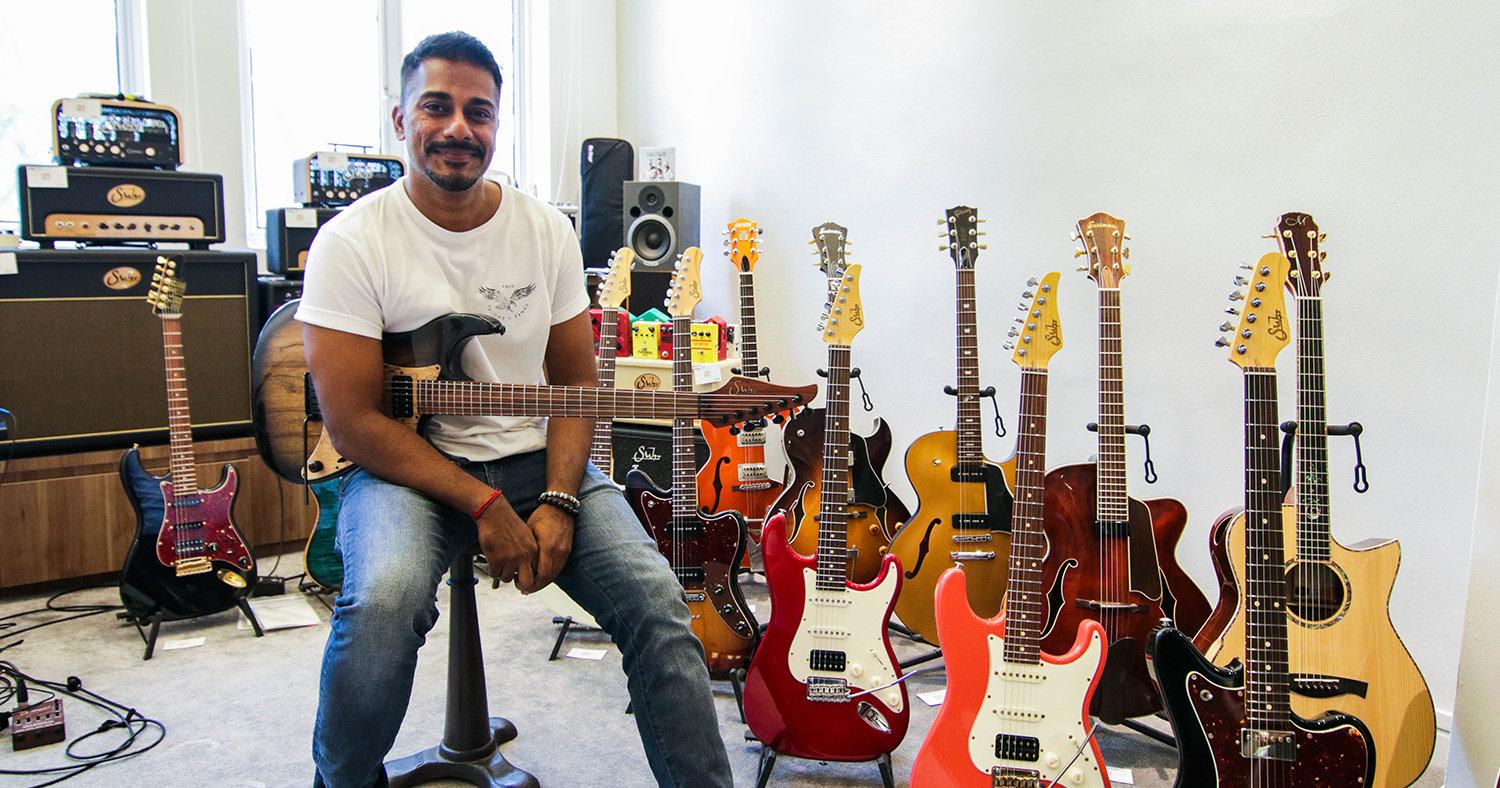You might have heard of Sivadorai Sellakannu (Rai, for short), half of local singing duo Jack & Rai.
If you haven't, he and Jack are one of Singapore's most established local acts in the live music scene. They've been around for decades now singing in pubs, and having their original songs aired on radio too.
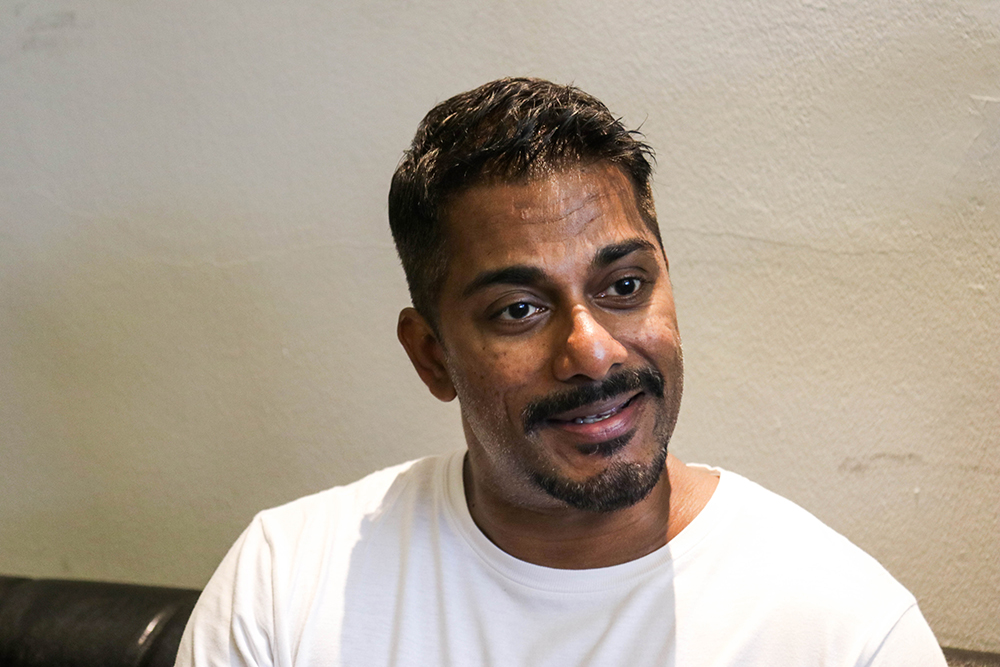 Photo by Rachel Ng
Photo by Rachel Ng
We are sitting in Rai's guitar shop, G77+, a large part of which is taken up by boutique guitars neatly displayed on the floor.
It's a very fitting expression of the 40-year-old’s journey, one in which his choices were and continue to be propelled by passion.
And it is here that he shares his interesting journey through the elite segment of our education system, out of it, and into something completely different — gigging, teaching, making and playing music.
Studying for the sake of studying
Rai started out as a typical Singaporean student whose parents had typical aspirations for him:
"There was always allocated play time, allocated study time, so that's literally what I did as a kid in Primary school. But the objective was always the same. My parents always wanted me to do well in the PSLE and go to a good secondary school."
That "good secondary school" was, of course, Raffles Institution.
And make it there he did. Rai found himself breezing through his first two years, too.
But in Secondary 3, he found his grades slipping and couldn't figure out why. What made things worse was the fact that he was in a class that was better academically — everyone else seemed to be cruising easily while his stress piled on from his grades' drastic decline.
Added to that was a persistent nagging feeling that he "wasn't doing what (he) really wanted to do".
Nonetheless, Rai scored seven points at his O-Levels. He thought about doing Mass Communications in a polytechnic, but was eventually convinced by his family (echoing societal sentiment of it being "funny" for a single-digit scorer to enter a poly) to go to Raffles Junior College and take the A-Levels instead.
But he found himself struggling with some of his subjects ("I sucked at Chemistry and I wasn't that good at Physics either"), citing general disinterest. The only thing he enjoyed was track, which he practised daily.
It was then that he decided he needed to do something that he wanted, and was interested in.
"I was studying just for the sake of studying," he says.
So after his A-Levels, Rai applied to be a Physical Education and English teacher with the National Institute of Education. He went on to study sports psychology at NTU.
"Your A-level results are actually all right, why do you want to become a teacher?"
What Rai tells us next reminds us how remarkably problematic Singaporean society and its perceptions of various education and career paths was, not much longer than 20 years ago.
"When I went for the MOE interview, there was one question which I remember so clearly. The interviewer actually asked me, 'Your A Level results are actually alright, why do you want to become a teacher?
On reflex, I said, 'I want to be a teacher, it's my choice'."
His decision to become a teacher, he elaborates, was also in part inspired by his own teachers, actually — his RJC track coach, Mr Mike, and his RI English teacher, Mrs Albar, both of whom he remembers with a broad smile:
"[Mr Mike] really helped me improve my time (as a 400m track runner) quite dramatically within a year. To go from nothing to winning a medal at the national schools level was a very big achievement for me. I'm always very proud of it."
Mrs Albar, says Rai, made the English language come alive for him.
"She made the English language so fun. She was a strict teacher, yet at the same time her lessons were enjoyable. I wanted to be an English teacher like her, to make students grow to love the language instead of having it drilled into them all the time."
Rai taught P.E. and English at Pei Chai Secondary School and RJC for a total of five years.
And he remembers, of all things, helping a student with her standing broad jump:
"There was one student of mine who was not very good at standing broad jump. I would help her out for a while, teach her, and guide her along. In the end she passed her physical fitness test. She came up to me at the end of the year and was like, 'Thanks so much for helping me pass my standing broad jump, without you I couldn't have done it'."
But he goes on, revealing how his mindset shifted from his teaching experience:
"As a teacher, or as a human being, sometimes you can be so hard on yourself. So I decided, when I was doing music, that it doesn't matter if I'm in a room filled with one hundred people. I don't have to touch all hundred of them. If just one person likes something that I do, it's fine."
First taste of music came during NS
The story of how Rai got into music is another fascinating thing — his first encounter with it came courtesy of a serendipitous leg injury:
“I was in NS and I had torn two ligaments... so I was out-of-course in SISPEC. I was bored because when you're out-of-course, you don't do anything. You just hang around and do manual labour."
Just at that point, an invitation to audition with the SAF's Music and Drama Company (MDC) came along and Rai decided to go for it.
"I was like, OK lah, can try something useful before I get posted somewhere even more useless," he says with a chuckle, leaning back into the couch he was sitting on. “I got in and that's how I got my foot into the music industry.”
It wasn’t long before an MDC friend of his pulled him into Singapore’s bar scene, and Rai started playing and singing at bars like Emerald Hill No. 5 and Barcelona — he was even part of a band called The Strawberries (pre-"Strawberry Generation", mind you), which disbanded later on because his two bandmates, Benny and John, went overseas.
And then for awhile, he gigged on his own, even while teaching — a routine he admits was a torture not to be inflicted on the faint-hearted:
"There were some days that I would teach until seven, gig until 12, go to my producer's house, record until three in the morning, and then go back home and go back to school. Tough life! It was crazy, but fun!"
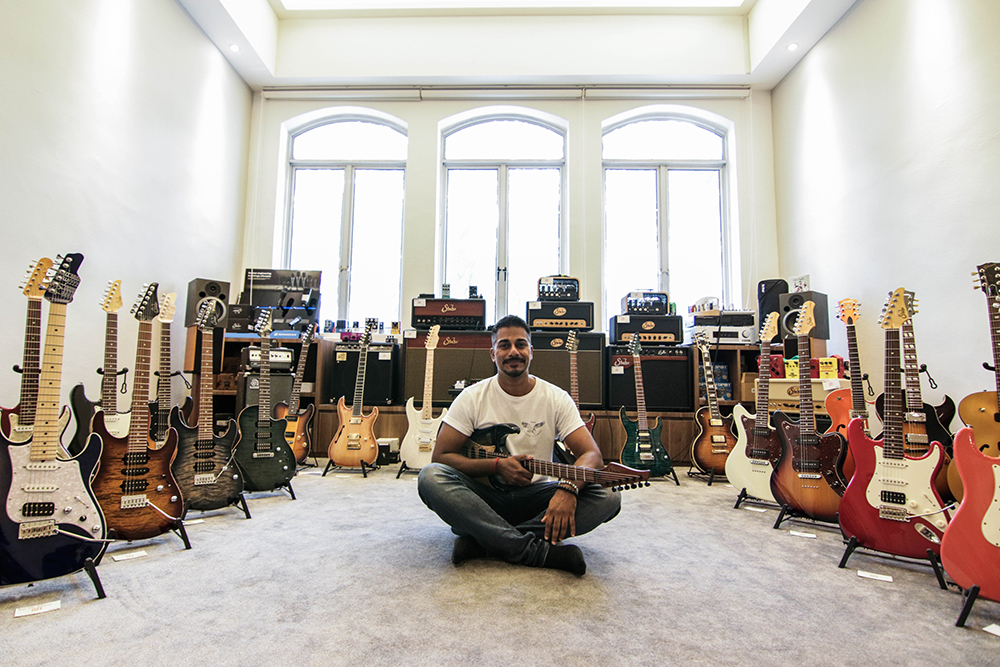 Rai in his guitar shop, G77+. Photo by Rachel Ng
Rai in his guitar shop, G77+. Photo by Rachel Ng
As he neared the end date of his bond with MOE when he was 29, Rai decided that he had to leave teaching (quite half-heartedly) to pursue music full time.
"My family was apprehensive but I told them that point in time it was just a plan to take a break from teaching for a while. I always feel, even for a teacher, that when you get stuck in an environment for too long, you only grow within that little circle. I wanted to get out and see things. I wanted to teach people things about the world, not just about books."
"I told my folks that I was going to take break for awhile, see how this music thing works out," he says, laughing. "It worked out, pretty alright!"
Becoming Jack & Rai "completely by chance"
We turn to how Rai came together with Jack, and we're starting to see a pattern.
He says by 2002, when they first started playing together, they had known each other, their music styles and tastes from years of playing separately at the same bars.
And on a whim, they thought, why not perform together over the Christmas and New Year period? After getting the green from Barcelona's management, Rai describes their show with another warm laugh as "so unrehearsed, we just went up and whacked!"
And the rest is history: the duo played alternative rock covers for an audience at Wala Wala in Holland Village that gradually grew with their repute. They also roped in some others to form a band and cheekily named it EIC, short for East India Company.
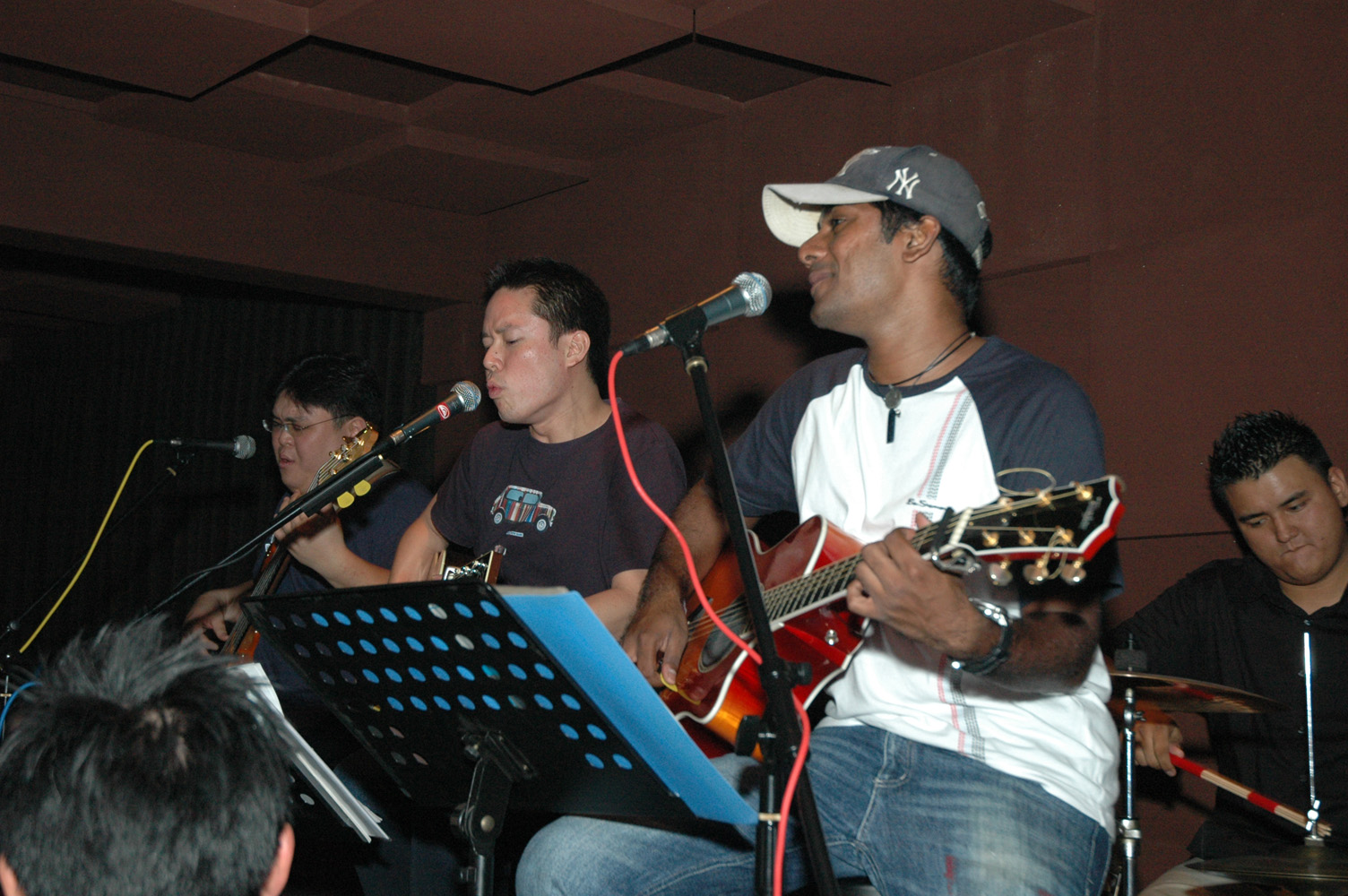 Jack & Rai performing with their band EIC. Image courtesy of Rai Kannu.
Jack & Rai performing with their band EIC. Image courtesy of Rai Kannu.
From there, they worked on and released "In Stores Now!" an album of original songs.
"We actually used to deliver our CDs to HMV, That CD Shop, Gramophone, and all that. I remember one of our first showcases was at Heeren, outside HMV, our album was like on the Heeren rack, wah Top Charts — Jack & Rai, In Stores Now! — and we were performing outside the Heeren.
That was then lah, when HMV still existed, and CDs were still OK!"
Jack and Rai went on to create jingles and theme songs for TV shows, most notably The Ground, the theme song for 2009 Channel 5 show "Polo Boys".
They continued performing live, anchored a year-long gig series at Timbre @ The Substation in 2014, and even opened The Flying Squirrel, a Japanese restaurant, five years ago.
Then there is also the guitar store that Rai set up with Jack and his bassist friend, Clement in 2016, a place born from their passion for beautiful guitars.
There's nothing brave about his choices
One may cast Rai's "unconventional" choices as inspiration for others to break out of the mould.
An alternative way of seeing it is certainly that his relative privilege proved helpful, perhaps a cushion, too, in giving him courage to buck the Raffles trend, and later on also quit an otherwise stable and well-paying job, to pursue his passion — and to be fair, he agrees that he is blessed in this regard.
That being said, he is adamant that there is nothing "brave" about his decisions, at least not when compared to the conventional ones his peers take:
"What makes you think that being a lawyer or doctor is any easier? You chose to do it as well. No matter what happens in life, given your circumstances, you always make choices. You make the best choices to suit your circumstances, to do what is your priority. I respect anyone who does that. Don't doubt your choices."
Today's music industry: a totally new ball game
This brought us to an elephant in the room — how is he, and how are they (Jack & Rai), staying relevant in today's music industry?
After all, in a scene dominated by the electronic melancholia of Charlie Lim and the rich pop sensibilities of Tabitha Nauser, the Sam Willows and Shigga Shay, Jack & Rai's folksy tunes come across as a tad old.
It doesn't help that they haven't evolved much in terms of style — not for lack of wanting to, but just that their characters don't fit the mould of today's biggest Singaporean names.
"They spend a lot of time improving their social media and reaching out to people. They do it in a way that makes me go — wah, everything bao ka liao (to handle everything on their own). I kind of admire that.
I sometimes wish that I could start over again so that I could better integrate into the present industry instead of changing what I am, because right now I have to learn a totally new ball game."
One of the skills required in this is digital marketing — something Rai admits he's not so good at, as compared to more traditional disciplines like songwriting. While he would like to learn it, he's also reluctant to go big into it, believing it may take him away from the main work that is creating music.
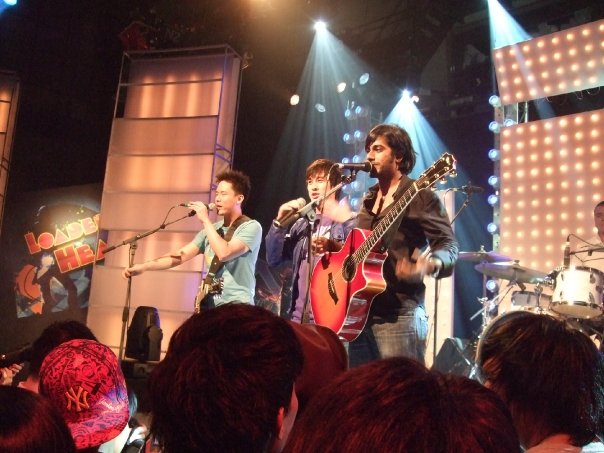 Back when he had long hair, performing live with Jack. Photo courtesy of Rai Kannu.
Back when he had long hair, performing live with Jack. Photo courtesy of Rai Kannu.
"All the newer musicians do a great job at (marketing themselves online and coming up with material), they're all pretty aggressive," he says.
But online marketing can only take one so far, Rai argues — physical networking, he maintains, still matters in the industry.
"It's a very personal thing for us, and we've been always doing that from our gigs, events, and stuff like that. It's because of our relationships with people that we can sustain being a musician.
Sometimes the problem with the digital age is that you do get a bit disconnected. I've actually seen some well-known YouTube people come and give live performances and they're like meh, boring ah. I think it's just what they're used to. When you're mostly online, you don't really have a live audience, you don't interact with people, there's no eye contact. There has to be a balance (between being online and offline)."
Which brings us to an unfortunate observation Rai shares: some places prefer to feature acts that can bring in crowds over others who are more musically sound.
"People are always on the look-out for people who have a strong social media following before they even actually audition. There are very few places that would actually promote bands based on their original material."
"I always question my shelf-life as a performer"
Back again to the question of Rai's longevity as an artiste, it's hard not to think of him as a "dinosaur", who in his words, "missed the boat". He knows this too.
"I always question my shelf-life as a performer but right now, I don't see an end to it. We want to evolve but we still want to retain that similar flavour to what we do but we can't just follow a trend and do the same kind of music that everyone else is doing. That's just really not our flavour."
Truth be told, I feel uncomfortable labelling Rai (and by extension, Jack) as has-been, because it would imply that his worth is measured against a conventional yardstick of success like singing at the National Day Parade, topping the radio charts, or even a thriving social media account.
And for someone who regularly marches to his own drum beat, that would be a great disservice.
This interview was conducted in collaboration with The Birthday Book. Rai contributed an essay for its 2018 edition, The Roads We Take.
Top photo by Rachel Ng.
If you like what you read, follow us on Facebook, Instagram, Twitter and Telegram to get the latest updates.
